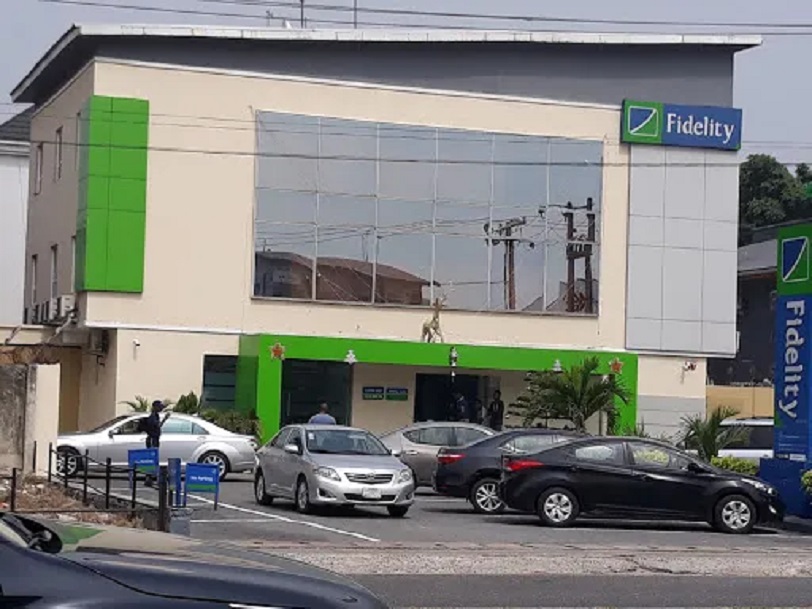Economy
Fidelity Bank to Pay 10 Kobo Interim Dividend as H1’22 PAT Jumps 20.7%

By Dipo Olowookere
Fidelity Bank is planning to reward its shareholders with an interim dividend of 10 Kobo for the half-year ended June 30, 2022, a disclosure from the financial institution has revealed.
The cash reward, according to the notice filed to the Nigerian Exchange (NGX) Limited, is subject to appropriate withholding tax.
It will be paid to shareholders whose names appear in the company’s register of members at the close of business on September 12, 2022, and then paid into their bank accounts on September 20, 2022.
The lender announced the payment of the 10 Kobo interim dividend after it released its financial statements for the period under consideration.
It was observed that the profit after tax of the firm improved by 20.7 per cent to N23.3 billion from the N19.3 billion reported in the same period of 2021, while the pre-tax profit increased by 21.9 per cent to N25.1 billion from N20.6 billion.
According to an analysis of the results, the gross earnings jumped to N154.8 billion from 2021’s half-year turnover of N112.3 billion as the net interest income expanded to N75.6 billion from N50.3 billion.
Business Post reports that the bank recorded N16.1 billion as fee and commission income in the first six months of this year compared with the N12.7 billion achieved in the same period of last year due to improvements across its key banking segments; retail, corporate and investment.
However, the lender could not cut down its personnel and other operating expenses as they went up significantly in the period under consideration.
Analysis showed that the personnel costs surged by 36.9 per cent to N15.2 billion from N11.1 billion, while the other operating expenses jumped by 56.7 per cent to N43.4 billion from N27.7 billion.
In the first half of the year, Fidelity Bank grew its deposits from customers to N2.3 trillion from N2.0 trillion as of December 31, 2021, while the loans disbursed to customers increased to N1.9 trillion from N1.7 trillion in FY 2021.
Economy
Index Gains 0.63% as Value of Nigerian Exchange Crosses N60trn

By Dipo Olowookere
For the fourth consecutive trading session, the Nigerian Exchange (NGX) Limited closed higher on Friday by 0.63 per cent on sustained renewed buying pressure.
Apart from the energy and industrial goods sectors which closed flat, every other sector ended in the green territory, according to data obtained from the bourse.
Business Post reports that the insurance index appreciated by 1.52 per cent, the banking space improved by 0.63 per cent, and the consumer goods counter expanded by 0.46 per cent.
As a result, the All-Share Index (ASI) gained 617.47 points to settle at 99,378.06 points compared with the preceding day’s 98,760.59 points and the market capitalisation went up by 375 billion to close at N60.242 trillion, in contrast to Thursday’s closing value of N59.867 trillion.
The volume of transactions on Customs Street yesterday grew by 11.13 per cent to 544.2 million shares from the 489.7 million shares transacted a day earlier.
The value of transactions increased during the session by 49.30 per cent to N10.6 billion from N7.1 billion and the number of deals went up by 1.93 per cent to 8,464 deals from the 8,304 deals posted in the previous trading session.
The busiest equity for the trading day was Japaul with the sale of 71.7 million units valued at N158.0 million, eTranzact exchanged 70.7 million units worth N477.5 million, Tantalizers sold 57.3 million units for N101.2 million, FCMB traded 33.0 million units worth N297.3 million, and Universal Insurance transacted 27.1 million units valued at N9.6 million.
A total of 36 stocks ended on the gainers’ chart, while 15 stocks finished on the losers’ table, indicating a positive market breadth index and strong investor sentiment.
The trio of Aradel Holdings, Ikeja Hotel and Caverton gained 10.00 per cent each to trade at N550.00, N8.80, and N1.98, respectively, as Africa Prudential rose by 9.87 per cent to N17.25 and Golden Guinea Breweries soared by 9.64 per cent to N8.64.
On the flip side, Austin Laz lost 10.00 per cent to close at N1.62, ABC Transport crashed by 8.00 per cent to N1.15, Royal Exchange slumped by 7.69 per cent to 60 Kobo, Secure Electronic Technology plunged by 5.26 per cent to 54 Kobo, and The Initiates crumbled by 4.26 per cent to N2.25.
Economy
Oil Jumps on Fresh Sanctions Amid Ease in Interest Rates, Demand Boost

By Adedapo Adesanya
Oil climbed by about 2 per cent on Friday on expectations that additional sanctions on Russia and Iran could tighten supplies and that lower interest rates in Europe and the US could boost fuel demand.
Brent futures went up by $1.08 or 1.5 per cent to settle at $74.49 a barrel and the US West Texas Intermediate (WTI) futures expanded by $1.27 or 1.8 per cent to close at $71.29 per barrel.
European Union ambassadors agreed to impose a 15th package of sanctions on Russia this week over its war against Ukraine, targeting its shadow tanker fleet.
The sanctions would target vessels from third countries supporting Russia’s war in Ukraine and add more individuals and entities to the sanctions list.
The sanctions package is likely to be formally adopted at a meeting of EU foreign ministers on Monday and will target close to 30 entities, over 50 individuals and 45 tankers.
Also, the US is considering similar moves that might target some Russian oil exports, before Donald Trump returns to the White House.
Britain, France and Germany told the United Nations Security Council they were ready if necessary to trigger a so-called “snap back” of all international sanctions on Iran to prevent the country from acquiring nuclear weapons.
The move comes as Iran has suffered a series of strategic setbacks, including Israel’s assault on Tehran’s proxy militias Hamas in Gaza and Hezbollah in Lebanon and the ouster of Iranian ally Bashar al-Assad in Syria.
Meanwhile, data from China this week showed that crude imports in the world’s top importer grew annually in November for the first time in seven months.
There are expectations that China’s crude imports will remain elevated into early 2025 as refiners opt to lift more supply from top exporter Saudi Arabia, drawn by lower prices, while independent refiners rush to use their quota.
The International Energy Agency (IEA) increased its forecast for 2025 global oil demand growth to 1.1 million barrels per day from 990,000 barrels per day last month, citing China’s stimulus measures.
The Paris-based energy watchdog forecast an oil surplus for next year, when nations not in the Organisation of the Petroleum Exporting Countries (OPEC) and allies, OPEC+ group, are set to boost supply by about 1.5 million barrels per day, driven by Argentina, Brazil, Canada, Guyana and the US.
The United Arab Emirates (UAE), an OPEC member, plans to reduce oil shipments early next year as OPEC+ seeks tighter discipline.
Economy
Seplat to Boost Nigeria’s Oil Production With Mobil Assets Acquisition

By Adedapo Adesanya
Seplat Energy Plc will revive hundreds of Nigerian oil wells laying fallow after completing the acquisition of Mobil Producing Nigeria Unlimited (MPNU) from ExxonMobil.
The company said it aims to lift oil output to about 200,000 barrels a day, a move that will help boost Nigeria’s oil production levels, as it aims to reach 2 million barrels per day next year.
The transaction, according to Seplat, “is transformative for Seplat Energy, more than doubling production and positioning the company to drive growth and profitability, whilst contributing significantly to Nigeria’s future prosperity.”
The completion of the Seplat-ExxonMobil deal has created Nigeria’s leading independent energy company, with the enlarged company having equity in 11 blocks (onshore and shallow water Nigeria); 48 producing oil and gas fields; 5 gas processing facilities; and 3 export terminals.
Recall that the Nigerian Upstream Petroleum Regulatory Commission (NUPRC) in October approved the deal as part of a series of approvals, while it blocked Shell’s asset sale of up to $2.4 billion to the Renaissance consortium.
The acquisition of the entire issued share capital of MPNU adds the following assets to the Seplat Group: 40 per cent operated interest in OML 67, 68, 70 and 104; 40 per cent operated interest in the Qua Iboe export terminal and the Yoho FSO; 51 per cent operated interest in the Bonny River Terminal (‘BRT’) NGL recovery plant; 9.6 per cent participating interest in the Aneman-Kpono field; and approximately 1,000 staff and 500 contractors will transition to the Seplat Group.
MPNU adds substantial reserves and production to Seplat Energy; 409 million barrels of oil equivalent (MMboe) 2P reserves and 670 MMboe 2P + 2C reserves and resources as at 30 June 2024 and 6M 2024 average daily production of 71.4 kboepd (thousand barrels of oil equivalent).
Business Post reports that Seplat will be part of the payment this year, and will defer some to next year,
Speaking on the transaction, the Chairman of Seplat Energy, Mr Udoma Udo Udoma commended President Bola Tinubu for supporting this transaction and appreciated the support and diligence of the various ministries and regulators for all the work to reach a successful conclusion.
“We are delighted to welcome the MPNU employees to Seplat Energy. We are excited to begin our journey in a new region of the country, and we look forward to replicating the positive impacts we have achieved within our communities in our current areas of operations.
“Seplat’s mission is to deliver value to all our stakeholders, and we treasure the good relationships we have developed with the government, regulators, communities and our staff.”
On his part, the chief executive of Seplat Energy, Mr Roger Brown, described the acquisition as a major milestone, adding, “I extend my thanks to the entire Seplat team for their hard work and perseverance to complete this transaction.
“MPNU’s employees and contractors have a strong reputation for safety and operational excellence, and I welcome them to the Seplat Energy Group.
“We have acquired a company with one of the best portfolios of assets and related infrastructure in a world-class basin, providing enormous potential for the Seplat Group. Our commitment is to invest to increase oil and gas production while reducing costs and emissions, maximising value for all our stakeholders.
“MPNU is a perfect fit with our strategy to build a sustainable business that can deliver affordable, accessible and reliable energy for Nigeria alongside attractive returns to our shareholders”.
-

 Feature/OPED5 years ago
Feature/OPED5 years agoDavos was Different this year
-
Travel/Tourism8 years ago
Lagos Seals Western Lodge Hotel In Ikorodu
-

 Showbiz2 years ago
Showbiz2 years agoEstranged Lover Releases Videos of Empress Njamah Bathing
-

 Banking6 years ago
Banking6 years agoSort Codes of GTBank Branches in Nigeria
-

 Economy2 years ago
Economy2 years agoSubsidy Removal: CNG at N130 Per Litre Cheaper Than Petrol—IPMAN
-

 Banking2 years ago
Banking2 years agoFirst Bank Announces Planned Downtime
-

 Sports2 years ago
Sports2 years agoHighest Paid Nigerian Footballer – How Much Do Nigerian Footballers Earn
-

 Technology4 years ago
Technology4 years agoHow To Link Your MTN, Airtel, Glo, 9mobile Lines to NIN






















